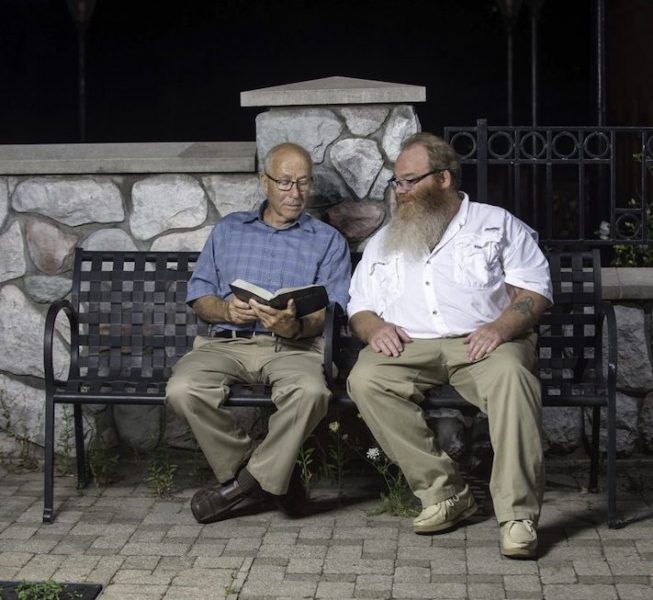"Thirty-Two Years of Trial"
March 1, 2022 | Judy Klein | Communications

Thirty-two years ago, Gilbert Poole Jr. was a very different man. And, if he had been shown his future, he probably would never have believed it.
Poole grew up in the backcountry of North Carolina, where the mountains rest, lazy in their blankets of grass. It was peaceful there, and some might say Poole should have stayed. But the Lord had other plans.
Poole moved to Michigan where he began dating a young woman. He and his girlfriend moved to South Carolina, but their relationship didn’t last long and the woman, whom Poole does not name, stormed off to the police station, demanding a ride back to Michigan.
A few days later, the police showed up at Poole’s house, telling him he was under arrest for a murder in Pontiac, Michigan. A man had been found stabbed to death near a common jogging trail.
Poole wasn’t worried. He didn’t murder the man, and he “trusted the system” to prove his innocence. The court appointed Poole a lawyer, but Poole never met the man. “I still haven’t seen him,” Poole says, laughing, “thirty-three years later!”
When the trial began, Poole was not worried. As time progressed, however, his opinion flipped, and terror grew like a weed, strong, willful and entirely impossible to kill. The prosecution had evidence against him—there had been bite marks found on the victim’s body—bite marks which they claimed matched Poole’s teeth. “It had no basis in science,” Poole says.

To make things worse, Poole’s ex-girlfriend testified against him. She claimed that Poole had told her that he committed the murder. Poole went to trial believing he would walk away a free man. Instead, on June 6, 1989, he was sentenced to life in prison for a crime he didn’t commit.
Innocence doesn’t take life in prison for an answer, and Poole appealed. “It was a long journey,” he says. There was lots of paperwork, and a legal agency to be contacted, asking for help. In 2001, twelve years later, he came across Innocence Project with Cooley Law School.

The Innocence Project, according to Poole, examines cases in which DNA may be involved. A blood sample from the victim’s shirt didn’t match his DNA—nor did it match Poole’s!
Fourteen years later, in 2015, the DNA was sent to the Michigan state police. Poole chose them specifically because there would be a less chance of someone tampering with the evidence. Unfortunately, the Michigan State police destroyed the evidence during testing. “That was the reason I wanted it to go to a Federal Lab!” Poole exclaims.
All hope was gone and it seemed there was no way to go but back into the abyss of despair. “Nothing was working,” Poole says. To make things worse, Poole got into trouble at prison—all because of who he spent time with. “I had to reevaluate who I was hanging out with,” he says, but “standing alone in a prison yard wasn’t going to end well.”

Poole turned to what he affectionately calls “Bible thumpers.” Poole had been isolated from any and all ideas of religion because of his upbringing. His father had forced the Jehovah’s Witness religion on him.
Poole started attending the Seventh-day Adventist prison group, led by Rod Dunneback, a Lansing church member. Moise Ratsara, pastor of the Jackson church, explained that during his time in prison, Poole faithfully completed all of the Bible study guides. After a year or so of studying and group attendance, Ratsara says, he “surrendered to Jesus and he got baptized in what almost looked like a bathtub.”
When Poole emerged from the water, his fellow Adventist prisoners sang a song. Ratsara comments, “It’s like his face completely changed! He was at peace after his baptism.” Ratsara recalls hoping, at that moment, that Poole would someday be freed.
Around this time, Poole discovered there was a new scientific test available. The test could use a partial profile to check for evidence—this new science allowed Poole’s case to be reopened, using the partial profile previously destroyed by the Michigan State Police. The test worked. There was new evidence that excluded Poole. On May 26, 2021, the state attorney general petitioned the court, and Poole was declared innocent.
“Some people would say that the stars aligned for me, but I have a question for you. Who aligns the stars?” Poole says. After thirty-two years in prison for a crime he didn’t commit, he was released. He says, “There are those that say ‘Never give up,’ ‘Keep fighting!’ I disagree. I didn’t keep fighting. I turned the battle over to God.”

As soon as Poole surrendered his life and his battle to God, things took an upward turn—events in which Poole was released from his thirty-two year battle for the truth. Poole was released, but his struggle is not over. “You can’t leave a battlefield without taking the battle home with you,” Poole says.
In the beginning, Poole was terrified to go to a grocery store. He had never seen a cell phone or a computer. The outside world had changed. “But fear,” Poole says,” is a lack of faith.” Thirty-two years ago, Poole did not know God. Thirty-two years ago, Poole was hopeless and drifting through life with no purpose. The Lord used this experience to bring Poole home.
Phil Mills, who pastors the Lansing church where Poole now regularly attends, comments, “If the Lord hadn’t let him go through this experience, he wouldn’t be a Christian… He will live forever because of it."
Poole’s story is an appeal to us. When life doesn’t go the way we wish, when it seems as if everything is falling down around our heads, we need to turn the battle over to God and let Him fight for us.
